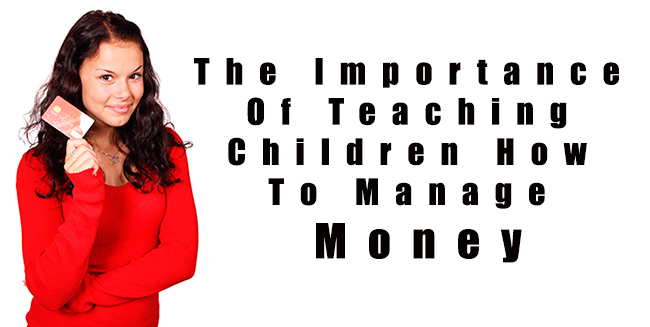Many young adults get their first real lesson in budgeting when they head off to college or rent their first apartment. This is when they realize that a dollar doesn’t go as far as they thought. After paying the rent, utilities, a car payment and food, they find out quickly that coming up and sticking to a budget is the only way to survive.

The Importance of Teaching Children How to Manage Money
Teaching children at a young age how to save for purchases they want will give them a head start on life and a better approach to money management. When they understand the importance of paying their bills on time and the need for establishing credit responsibly, they will grow up with respect for the money they earn.
A Lesson in Credit
Letting children experience a credit card and how it works will give them knowledge and appreciation, so that when they do set out on their own they are less likely to run up debt. Since there are many different types of credit cards available explaining the advantages and disadvantages is a good place to start. There are those that you need to pay back in full within a month, those that have a low introductory rate, some with reward programs and some with 0% balance transfer offers. Having an additional card from your account added with their name on it will help them to get an understanding of how a credit card works.
Start Teaching Young
Young children are very bright. They pick up on things quickly. Teaching children how to handle expenses early on will have lasting benefits that they will carry with them into adulthood. If there’s something they want and you agree to buy it for them, have them pay it back over time. This is an excellent way to instill responsible behavior with a loan. In this case, the product is their toy and the value is paid on the credit card. Each week when they receive their allowance they have to hand over a portion towards their purchase until it’s paid off. Once they reach their teen years they can acquire their own credit card and begin the process of establishing their credit. Having the responsible background behind them, they will understand that each purchase must be paid in a timely fashion. This will not only help them achieve a desirable credit score but help them to eliminate the “impulse” purchases.
Savings 101
In addition to teaching young children about credit cards, learning to save money is just as important. When they receive their allowance you should also make it mandatory that a percentage of their earnings go into a savings account for a rainy day. A child won’t quite get the concept of a mortgage, rent, utilities and all of that. Instead, keep it simple. Their rainy day could be a large item they want like a new bike or a gaming system. Make it something that they will need to save up for over time. This way when they have the money saved they will understand that it took quite a while to get their item. As they grow older they can save for a car or college. By the time they are ready to leave home, they will have a greater appreciation for money, an understanding of proper management and a nice savings account.
Teaching children when they are young how to handle expenses is smart. It teaches responsibility so that when they enter the adult world they are prepared and will think twice before piling on unnecessary debt. When children learn to save and pay off items from their own earnings, they are also learning how hard and long they have to work to acquire these things.






Speak Your Mind